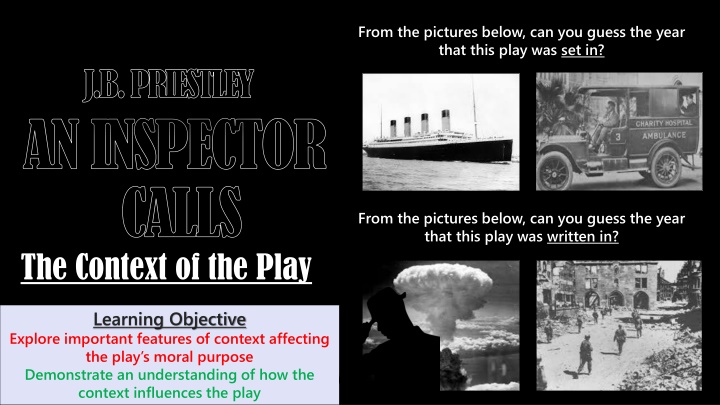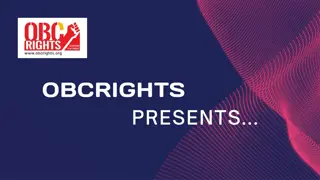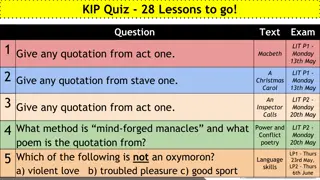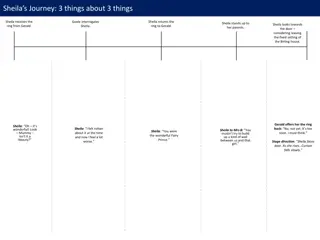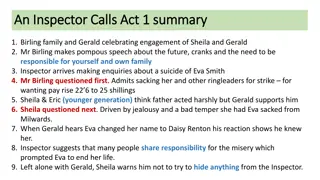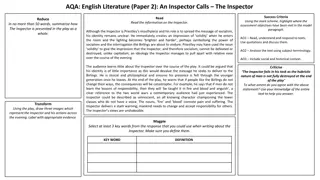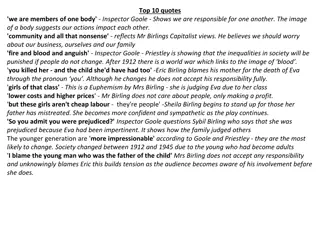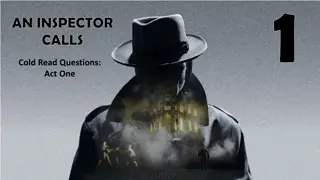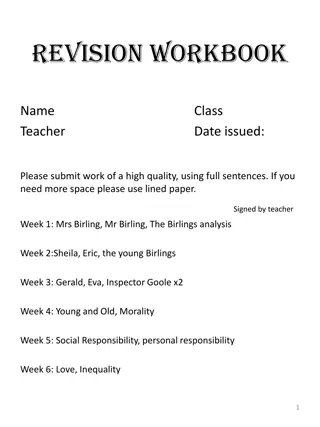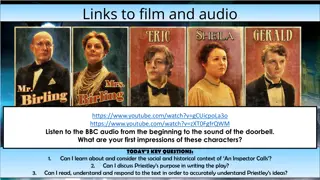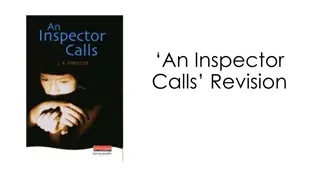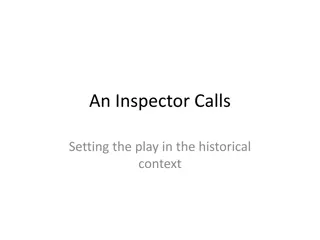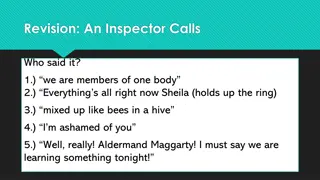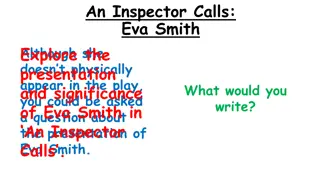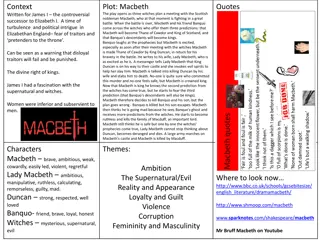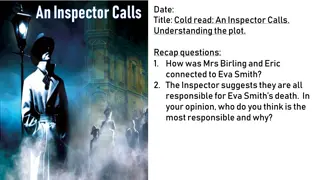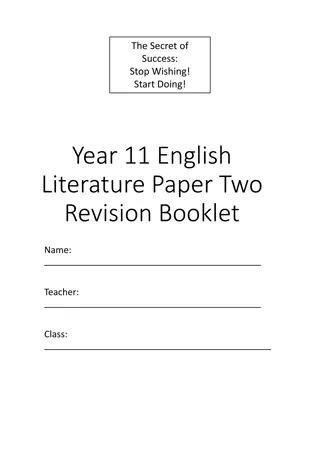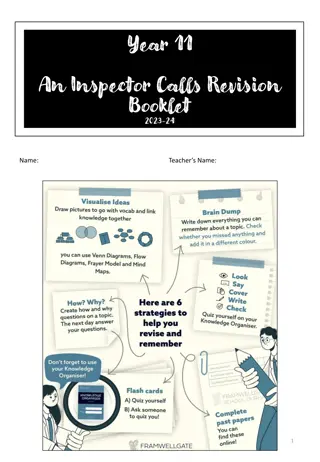Contextual Evolution in J.B. Priestley's Play: An Inspector Calls
J.B. Priestley's play "An Inspector Calls" was set in 1912 but written in 1945, reflecting the significant changes in society between these years. Explore the context and events that influenced Priestley's work, showcasing his socialist views and the impact of historical events like WWI and WWII on his writing.
Download Presentation

Please find below an Image/Link to download the presentation.
The content on the website is provided AS IS for your information and personal use only. It may not be sold, licensed, or shared on other websites without obtaining consent from the author.If you encounter any issues during the download, it is possible that the publisher has removed the file from their server.
You are allowed to download the files provided on this website for personal or commercial use, subject to the condition that they are used lawfully. All files are the property of their respective owners.
The content on the website is provided AS IS for your information and personal use only. It may not be sold, licensed, or shared on other websites without obtaining consent from the author.
E N D
Presentation Transcript
From the pictures below, can you guess the year that this play was set in? J.B. PRIESTLEY AN INSPECTOR CALLS The Context of the Play From the pictures below, can you guess the year that this play was written in? Learning Objective Explore important features of context affecting the play s moral purpose Demonstrate an understanding of how the context influences the play
was set way back in 1912, the year the Titanic set sail, and cars were a new invention AN INSPECTOR CALLS by J.B Priestley but was written years later in 1945, when the atomic bomb struck, and WWII ended. Learning Objective Explore important features of context affecting the play s moral purpose Demonstrate an understanding of how the context influences the play
J.B. PRIESTLEY Learning styles and outcomes: AN INSPECTOR CALLS The Context of the Play Learning Objective Explore important features of context affecting the play s moral purpose Demonstrate an understanding of how the context influences the play Active Listener: You will make relevant notes as you listen Close Reader: You will analyse a text and extract key information
J.B Priestly (1894-1984) was a novelist, playwright, and scriptwriter from Yorkshire, who was born into a working class background. J.B Priestley He knew from an early age that he wanted to be a writer, but he decided against going to university as he did not want to be influenced by academia. The play is a conscious construct .think about WHY Priestley wrote it. What was he trying to show/highlight? He was a socialist (left wing) writer, although he didn t particularly align himself to any parties. His socialism was more about his care for others. In the First World War, Priestly joined the infantry, and nearly died a few times! Afterwards, he gained a degree from Cambridge University, and became a successful writer.
What Changed? 1912-1945 A lot of things changed between 1912 (when the play was set) and 1945 (When Priestley wrote it) Let s re-cap what events happened between these years. Divide your page into two and make notes on what life was like in the UK in 1912 and 1945. 1912 1945
https://www.youtube.com/watch?v=3fXw8lWWtlA&app=desktop Activity 1 (10 minutes): As you watch, make notes on what life was like in the UK in 1912 and 1945. Activity 2 (15 minutes): The slides afterwards have further information on for analysis. By the end of these two activities, you should have good quality notes on the context of the play. Close Reader: You will analyse a text and extract key information
WAR Think about the audience in 1945, they may have either fought in the war or have lost loved ones in both world wars. Lots of people came back from the fighting and were seriously disabled. Many people had lost homes and jobs in the bombing at home. Many had lost friends, family and community. People wanted to create a fairer society people from all social classes had fought and died in the war. In 1945 In 1912 Two world wars had just taken place in fairly quick succession, and atomic bombs had been dropped on Japan. This was a time when many people felt scared and vulnerable. This was a time of relative peace and calm. Britain was involved in no major wars around this era. This was a time when many people felt fairly secure.
WOMENS RIGHTS In 1912 it was a patriarchal society- women at that time were seen as being obedient to their husbands or fathers. They belonged to men, and had little rights or power. For working class women, a job was crucial. There was no social security at that time, so without a job they had no money. There were very few options open to women in that situation: many saw no alternative but to turn to prostitution. In 1912 Women were inferior to men. The best that a woman could hope for would be to marry a successful, wealthy husband. Poor women were used for cheap labour. In 1945 Women had filled in for men during the world wars, and had proven themselves as capable workers. They were finally more valued in society. However, women were trying to get rights the same as men, beginning the Suffrage movement in around 1865. They began petitioning the government for the right to vote.
CLASS Think about the audience in 1945 Post WW2- they would be mostly middle class (who could afford to go to the theatre)- what is Priestley trying to get them to do? There was a large difference in class systems; the rich got richer and the poor got poorer. Many hard times fell upon the poorer working classes. There was the General Strike and the Great Depression during the 1930 s. 1942 - Welfare State proposed social security from the cradle to the grave. This was the beginning of a system which took care of people who could not take care of themselves. At the time the play was written (1945) this was still not established but people were beginning to realise that it was needed and the implications of it not being in existence. In 1945 The two world wars, in which men of all different backgrounds had fought and died together, meant that class divisions were not as wide as they used to be. In 1912 There was a strong class system in place in Britain. Those born into wealth lived privileged lives, whilst many working class people lived harsh and cruel lives.
ATTITUDES Capitalism was the leading political and societal attitude at the time and had been for many years. This system benefitted the rich and powerful. However, with the hardship that the wars brought, Socialism became popular and campaigners rose up against the ruling capitalists. JB Priestley was one of these campaigners and used his play to voice his political opinions. In 1945 A new-found spirit of community and togetherness was formed from the shared difficult experiences. Clement Atlee s Labour party won by a huge majority. In 1912 The ruling classes saw no need to change the set way of things. They were very much interested in looking after their own.
The BIG question: WHY? Why did Priestley choose to set his play in 1912? What do you think he wanted the audience to learn about recent history and the way we lived? DRAMATIC IRONY- Dramatic irony occurs when the audience knows something that the characters don't. This technique emphasizes key moments and messages within a play Key dramatic technique you MUST include in your analysis of any question on An Inspector Calls Priestley uses dramatic irony to UNDERMINE both Mr Birling & the ruling classes throughout the play. He does this to make them appear foolish & untrustworthy. He wants the audience to re-assess their thoughts and views and to become more socially responsible for others around them to have a MORAL EPIPHANY!
Plenary discussion: What kind of society do we live in today? Or are we somewhere in-between? Which political parties represent these different ideologies? Capitalism is an economic system where things are owned by people or an individual and where people have to work for money. It has the view that if you work hard you will be rewarded. Everyone should pay their own tax. The poor should work harder to earn more. Socialism is a system which results in the divide between classes getting smaller, with the poorest of a nation's people getting better taken care of while the richest make sacrifices in terms of higher taxes and regulation of business. Where people work together to gain a fair standard of living. The view of living together and looking out for each other.
